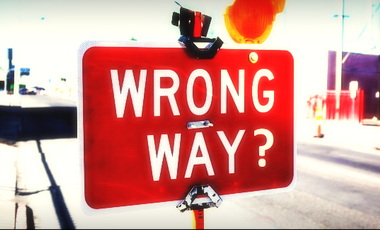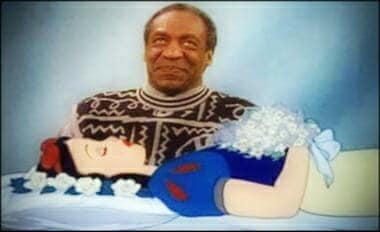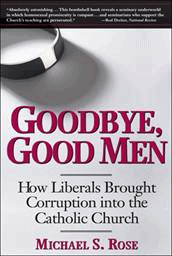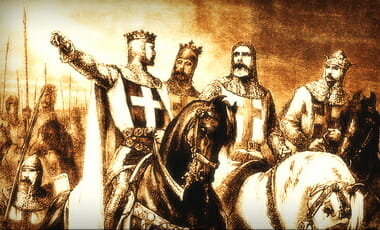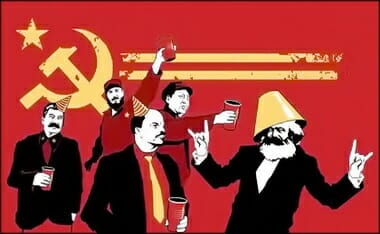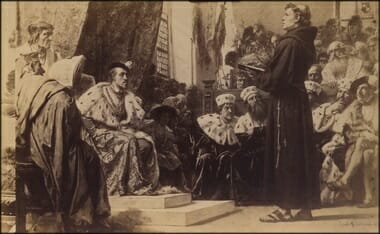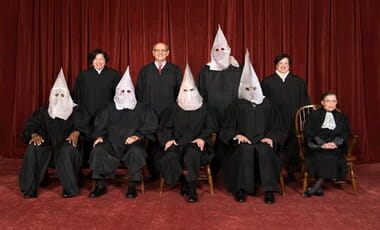As a related aside, the following two posts of mine marry well to the topic below:
Reading a book on hyper-preterism recently has been a great read. I am a pretty classic “pre-mil” guy, but recently I was watching a vlogcast and the guy started getting into his beliefs that were hyper-preterist. I had studied a bit of preterism in my theological studies… but this guy was saying some crazy, unorthodox, shite. So I got this book to learn more about this foreign viewpoint.
A small sentence from said book got my apologetic blood circulating:
- Below I will highlight a few danger signals that suggest that we may be witnessing the sprouting of a new unorthodox sect that could eventually blossom into a full-fledged cult. (p. 13)
However, as I am reading through this book, I purchased a used book to follow the footnote a bit more thoroughly.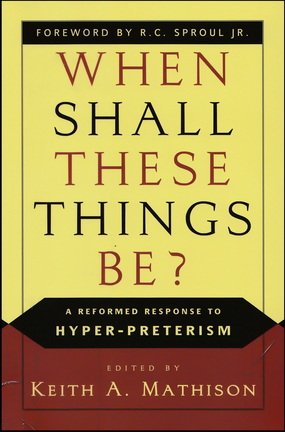
Wow.
So, I will first give the section in the original book, then the very extended excerpt from the book I got via footnote #175:
“Creeds Are Constantly Revised”
Hyper-preterists attempt to protect themselves from creedal condemnation by arguing that the creeds are continually being revised. Stevens frequently argues that creeds “are constantly being made obsolete by an ever better understanding” (CPO). He muses: “If the creeds of the early church were perfect and needed no revision, why were they revised and updated in succeeding councils?” (WICW). And “if the earlier creeds, confessions and catechisms were such infallible bastions of orthodoxy, why did the Reformers in various European countries compose new ones or make changes to them?” (RGA). He quotes a statement made by the Reformed historian and social critic Gary North regarding the “progress of Christian creeds,” concluding that “That the creeds have been steadily improved” (RGA). Stevens asks of various theological movements, “Why are even more doctrines constantly being developed today (such as the Reconstructionist movement, etc.)? Doesn’t this tell us something?” (WICW). Noe asks: “After all, if the creeds had it all right, what was the Reformation about?” (BET, 216).
We may quickly dispose of the question “What was the Reformation all about?” by referring the reader to the previous objections regarding the Reformation principle and the (alleged) contradictions in creedalism. In addition, I would point out that Davis reminds us that “it is important to realize that the sola scriptura principle did not imply for the Reformers a rejection of all church tradition. They affirmed the value and validity of the ecumenical creeds of the early church, and in fact believed that the weight of patristic authority supported the Reformed cause.”175 In fact, in section 4 of his “Prefatory Address to King Francis” in his Institutes, Calvin writes of his papal opponents: “It is a calumny to represent us as opposed to the Fathers (I mean the ancient writers of a purer age), as if the Fathers were supporters of their impiety. Were the contest to be decided by such authority (to speak in the most moderate terms), the better part of the victory would be ours.”
However, the hyper-preterist argument is not just confused; its entire premise is mistaken. The creeds were not revised because of a change in the understanding of biblical doctrine; rather, they were expanded to include additional details that responded to new heresies. The later creeds left the system of truth unchanged, but the volume of truth declared was expanded. Ursinus writes: “Why were other creeds… formed and received in the church after the Apostles’ creed? To this we would reply, that these are not properly other creeds differing in substance from the Apostles’ creed, but are merely a repetition and clearer enunciation of its meaning, in which some words are added, by way of explanation, on account of heretics, who took advantage of its brevity, and corrupted it.”176
Thus, it is absurd to allege that creeds are “constantly being made obsolete” (CPO). The newer material did not render the previous theology “obsolete,” but rather filled in more details. This is why, for instance, John Calvin could structure much of his discussion in the Institutes around the Apostles’ Creed. He agreed with it even at this much later stage of theological development. In the introduction to the McNeill edition of the Institutes, we read: “The body of the treatise of 1536 consists of six chapters. Four are on topics familiar in the history of Christian instruction and then recently employed in Luther’s Catechisms: the Law, the [Apostles’] Creed, the Lord’s Prayer, and the sacraments of Baptism and the Lord’s Supper.”177
- John Jefferson Davis, Foundations of Evangelical Theology (Grand Rapids: Baker, 1984), 226.
- Ursinus, Commentary of Dr. Zacharias Ursinus on the Heidelberg Catechism, 117-18.
- Calvin: Institutes, ed. McNeill, 1:xxxv-xxxvi.
Keith A. Mathison, ed., When Shall These Things Be? A Reformed Response To Hyper-Preterism (Phillipsburg, NJ: P&R Publishing, 2004), 55-56.
After finding and reading the portion from Dr. Davis’ book, I loved the surrounding topic so much that I ended up reading the entire chapter (seven) where the quote was pulled from:
Tradition As Theological Authority
It was a great reading on Protestant tradition compared to the Catholic view.
So, here is footnote #175 expanded quite a bit. I will also expand a bit more footnote #176 as well. Both quotes from the source will be emphasized in the larger excerpts
- PRO-TIP: I will put links in the footnote numbers, if you click it it will “jump” you to either the first-half of the notes, or the second half. Hit the back arrow in your browser to return to your place in the text.
John Jefferson Davis,
Foundations of Evangelical Theology
(Grand Rapids: Baker, 1984), 226-243.
Tradition in Protestantism
Sola scriptura and the Reformation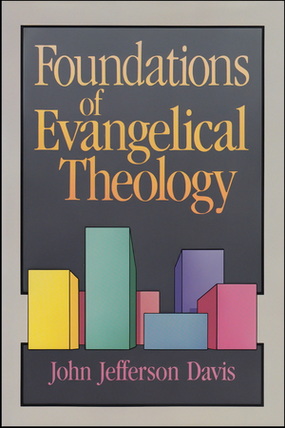
The principle of sola scriptura, a hallmark of the Protestant Reformers, emerged in Luther’s debate with Johann Eck at Leipzig in 1519. Luther argued that scripture and scripture alone was to be the standard by which councils, creeds, and all ecclesiastical traditions were to be measured. In the seventeenth century the principle was epitomized in the well-known statement of the Englishman William Chillingworth: “The Bible, I say, the Bible only, is the religion of Protestants.”5
Luther was not the first to voice this “Protestant” principle. John Wyclif, one of the forerunners of the Reformation in England, stated, “Even though there were a hundred popes and though every mendicant monk were a cardinal, they would be entitled to confidence only in so far as they accorded with the Bible.” As J. Loserth has noted, “In this early period it was Wyclif who recognized and formulated the formal principle of the Reformation—the unique authority of the Bible for the belief and life of the Christian.”6
The authorities of the late medieval church did not appreciate the reforming spirit of John Wyclif and his criticisms of the papal system. After his death the Council of Constance (1414-18) declared Wyclif to be a stiff-necked heretic, ordered his books to be burned and his body exhumed. This last decree was carried out some twelve years later under the authority of Pope Martin V. Wyclif’s body was dug up, burned, and the ashes thrown into the Swift River flowing through Lutterworth, England.
It is important to realize that the sola scriptura principle did not imply for the Reformers a rejection of all church tradition. They affirmed the value and validity of the ecumenical creeds of the early church, and in fact believed that the weight of patristic authority supported the Reformation cause. As Calvin stated the point, “If the contest were to be determined by patristic authority, the tide of victory—to put it very modestly—would turn to our side.” The Reformers were convinced that it was the papacy, and not they, who in fact had departed from the early Christian tradition. Later historical scholarship has confirmed this judgment.7
Sola scriptura meant the primacy of scripture as a theological norm over all tradition rather than the total rejection of tradition. Creeds, confessions, and councils were to be received insofar as they were consistent with scripture. The sola scriptura principle also presupposed the essential clarity of scripture. The central saving message of the Bible was plain enough to be understood by all and needed no priestly hierarchy to explain it. The Holy Spirit, and not the Roman hierarchy, was the true illuminator of scriptural truth. This Reformation principle of the perspicuity of scripture was later articulated in classic fashion in the Westminster Confession of Faith’s chapter on scripture: “All things in Scripture are not alike plain in themselves, nor alike clear unto all; yet those things which are necessary to be known, believed, and observed, for salvation, are so clearly propounded and opened in some place of scripture or other, that not only the learned, but the unlearned, in a due use of the ordinary means, may attain unto a sufficient understanding of them” (I.vii).
This Reformation emphasis on the perspicuity of scripture has unfortunately been lost in some streams of later Protestantism. Luther complained about the “Babylonian captivity of the church;” with the rise of the historical-critical method there is some reason to be concerned about a “Babylonian captivity of the Bible” at the hands of the biblical critics. Many lay people in the churches have been alienated from the simple biblical message by the imposing developments of critical scholarship.8 By stressing the diversity or even “contradictions” of scripture, critical scholarship has obscured the essential clarity of the Bible’s saving message.
In a dialogue at Harvard Divinity School on liberal and evangelical theology, Gordon Kaufman stated his belief in the Bible’s obscurity. “There are many biblical positions on almost any topic you wish to take up,” he said. “The Bible is a pluralist library of books, of theological ideas, of values, of points of view. … What the biblical position is is unclear. … Even if we could find the biblical position, how to interpret this as bearing on our situation is unclear.”9
It indeed seems ironic that the brand of Protestant liberalism represented by Kaufman has essentially reverted to the position of the late medieval Roman Catholic Church on the question of scripture. The message of the Bible is not plain; it must be mediated to the people through either an ecclesiastical or scholarly elite. The result in both cases—Catholicism and Protestant modernism—is a loss of spiritual vitality in the churches and the usurpation of scripture’s divine authority by various human authorities.10
American Protestantism
American Protestantism has not been noted for its appreciation of church tradition. Thomas Jefferson once remarked, “As to tradition, if we are Protestants, we reject all tradition, and rely on the scripture alone, for that is the essence and common principle of all the Protestant churches.”11 Such comments need to be understood in the light of Jefferson’s own Unitarian and otherwise heterodox views, but they are illustrative of a significant element in the American religious temperament. The streams of Protestantism influenced by deism and rationalism tended to appeal directly to the moral teachings of Jesus; later developments in church history—especially the great orthodox creeds—were an “obfuscation” of the simple religion of the Sermon on the Mount. As the English Unitarian Joseph Priestly saw it, church history was little more than a “sordid history of corruptions.”
Historian Kenneth S. LaTourette has noted the marked tendency of nineteenth-century American Protestants “to ignore the developments which had taken place in Christianity in the Old World after the first century.”12 This low view of tradition is understandable in part in view of the frontier conditions of early American experience. For those who came to America, and who later extended its boundaries in the West, the nation represented a new beginning, even a “new Eden.” Why encumber the new religious venture with the strife and controversy of the European past?
This ahistorical mentality was also reinforced by the revivalism of the nineteenth century. If the spiritual experience of the New Testament church could be reduplicated through the agency of revival preaching, what more could the believer need? Why bother with the ancient creeds? This anti-creedal mentality found expression in the work of frontier revivalist Barton Stone (1772-1844). Stone was ordained as a Presbyterian, but later rejected Calvinism and in 1804 established the Christian Church (“Disciples of Christ”) through his preaching in Ohio, Kentucky, and Tennessee. The Disciples of Christ were associated with the slogan, “No creed but the Bible.” Eighteen hundred years of church history were of little or no value; Stone had rediscovered the true “New Testament church.”
There is undeniable value in reaffirming the theology and practice of the New Testament as an essential element of church reform. However, the problem in rejecting all church history and tradition is that the reflections of less gifted minds tend to be substituted for the wisdom of the spiritual and theological giants of the past. Evangelicals can affirm the primacy of scripture without implying that the Holy Spirit has taught nothing to the church over nineteen hundred years. A slogan such as “No creed but the Bible” does not really eliminate all church tradition; it merely substitutes new traditions—those of the denominational leader and his followers—for older ones.13 Anti-creedal and anti-traditional attitudes can lead, theologically and ecclesiastically, to counterproductive efforts that merely “reinvent the wheel.”
Recent developments
There are signs that American evangelicalism is seeking a greater appreciation of the traditions and liturgies of the early church. In Common Roots: A Call to Evangelical Maturity, Robert E. Webber of Wheaton College argues that “a return to the historic church, to the great fathers of the first five centuries, is a return to evangelical foundations.”14 Evangelicalism is certainly rooted in the Reformation of the sixteenth century and the great revival movements of the nineteenth century, but Webber is urging his fellow evangelicals to rediscover their roots in the faith and life of the ancient church. He argues that evangelical understandings of the nature of the church, of worship, of spirituality, of mission, and of theology can all be strengthened through a new study and appreciation of the patristic heritage.
In May of 1977 a group of some forty-five evangelical leaders met to draft a statement which came to be known as the “Chicago Call.” The results of this conference, together with explanatory essays, was published in 1978 in a volume titled The Orthodox Evangelicals, edited by Robert E. Webber and Donald Bloesch, which affirmed: “We believe that today evangelicals are hindered from achieving full maturity by a reduction of the historic faith. … There is … a pressing need to reflect upon the substance of the biblical and historic faith and to recover the fullness of their heritage.”15 The drafters of the statement sought to recall their fellow evangelicals to a greater sense of “historic roots and continuity,” “biblical fidelity,” “creedal identity,” “holistic salvation,” “sacramental integrity,” “spirituality,” “church authority,” and “church unity.”
The new interest in the theological and liturgical heritage of the early church is not limited to evangelicals. Thomas C. Oden, a professor of theology at Drew University, has chronicled his own personal pilgrimage from theological liberalism back to “classical Christianity” in Agenda for Theology. Liberal theology’s fascination with and subservience to the “modern mind” has reached the end of its tether, Oden concludes. It has become intellectually barren and spiritually and pastorally unsatisfying. Consequently, it is time for liberal Protestantism in America to rediscover the resources of classical Christianity–“the ancient ecumenical consensus of Christianity’s first millennium, particularly as expressed in scripture and in the Seven Ecumenical Councils affirmed by Catholic, Protestant, and Orthodox traditions.” Oden’s aim is to “help free persons from feeling intimidated by modernity, which . . . is rapidly losing its moral power, and to grasp the emerging vision of a postmodern Christian orthodoxy.”16
The new appreciation for the patristic heritage among evangelicals (and those newly sympathetic to evangelicalism) is an encouraging sign in the life of American Protestantism. While the early church can hardly be considered a model of either theological or spiritual perfection, nevertheless the new interest in patristics offers evangelicals some much needed historical depth and perspective. The early fathers faced a challenge much like our own—preserving and extending the Christian faith in a declining social order permeated by a decadent humanism. As evangelicals attempt to “recontextualize” the faith to meet changing social conditions, and to reconstruct a new social order on biblical foundations, there is much to be learned from the fathers of the early church.
In a somewhat different context the work of Brevard Childs in Introduction to the Old Testament as Scripture, also represents a renewed appreciation for the positive role of tradition in American Protestantism. Childs argues that Old Testament scholarship must take more seriously the canonical shape of the biblical text as it has actually been mediated through the life of the religious communities which have preserved it. The dominant tendency of older critical scholarship was to virtually bypass the canonical text as a literary whole in its own right in a search for the (hypothetical) sources and documents behind the text. On the contrary, Childs argues, where the actual text of the Old Testament is concerned, “One begins with the tradition and then seeks critically to understand it.”17 This emphasis has the value of recognizing the traditional role that the text played in the life of Israel as a religious community; the Old Testament becomes more than merely a text studied in the abstraction of a modern academic setting. The shape of the canonical text, reflecting actual religious traditions, also provides helpful clues for understanding the thematic unity of scripture as over against the fragmenting approaches of nineteenth-century scholarship.
Beyond the confines of biblical and theological scholarship there are signs of renewed interest in the role of tradition in the knowing process among twentieth-century philosophers. The German philosopher Hans-Georg Gadamer has recently issued sharp criticisms of the Enlightenment’s rejection of tradition in a quest for secular, self-grounded certitude. This quest, Gadamer believes, has not been successful. In ‘Ruth and Method, widely read by biblical and theological scholars for its insights in the area of hermeneutics, Gadamer argues that tradition is in fact the “horizon” within which we do our thinking. The process of human understanding involves placing oneself “within a process of tradition in which past and present are constantly fused.”18 Tradition is the embodiment of the linguistic and intellectual heritage of a culture; one can no more think without the influence of tradition than one can think without language.
Michael Polanyi has written that “all mental life by which we surpass the animals is evoked in us as we assimilate the articulate framework of our culture.”19 Or again, “Human thought grows only within language and since language can exist only in a society, all thought is rooted in society.”20 Polanyi is arguing that the preconditions of all human knowledge are found in the linguistic heritage of a culture, a heritage which is traditional in nature.
A similar point was made by Ludwig Wittgenstein in the Philosophical Investigations, when he stated that the linguistic practices of a community become conditions through which we see the world.21 These observations by Gadamer, Polanyi, and Wittgenstein, based on new insights in the philosophy of language, help to correct the Enlightenment’s rejection of tradition and to restore to its rightful place the role of the intellectual labors of the past in the knowledge and discoveries of the present.
Tradition in Roman Catholicism
Early positions
Tradition plays a more prominent and authoritative role in Roman Catholic theology than in evangelical Protestantism. At the Second Vatican Council it was stated that “it is not from sacred Scripture alone that the church draws her certainty about everything which has been revealed. … Both sacred tradition and sacred Scripture are to be accepted and venerated with the same sense of devotion and reverence,” (Documents of Vatican H, p. 117).
This position, however, represents a long process of development in Roman Catholicism away from an earlier one in which scripture was granted clear primacy over all church tradition. Prior to the fourteenth century the church fathers and medieval theologians generally held that the Bible was the unique and sole source of divine revelation. Aquinas, for example, could state that “arguments from scripture are used properly and carry necessity in matters of faith; arguments from other doctors of the church are proper, but carry only probability; for our faith is based on the revelation given to the apostles and prophets who wrote the canonical books of the scriptures and not on revelation that could have been made to other doctors” (Summa Theologica 1.1,8).
In late medieval theology, however, the theologians begin to speak of church tradition as that which authorizes scripture. Duns Scotus, for example, claimed that the “books of the holy canon are not to be believed except insofar as one must first believe the church which approves and authorizes those books and their con-tent.”22 This latter formulation represents a clear denial of what came to be known during the Reformation as the principle of the self-attesting authority and essential clarity of scripture.
Rent and later developments
In response to the challenge of the Reformers’ sofa scriptura principle the Roman Catholic position on tradition as it had developed in the medieval church was officially formulated at the Council of Trent in 1546. “Following, then, the example of the orthodox Fathers,” the council declared, “it receives and venerates with the same piety and reverence all the books of both the Old and New Testaments—for God is the author of both—together with all traditions concerning faith and morals, for they came from the mouth of Christ or are inspired by the Holy Spirit and have been preserved in continuous succession in the Catholic Church” (Denz. 1501).
The position of Trent was reiterated by the First Vatican Council in 1870, called to bolster Catholicism against the challenge of modernism. On the matter of revelation and tradition, this council declared that “this supernatural revelation, according to the universal belief of the church, declared by the Sacred Synod of Trent, is contained in the written books and unwritten traditions which have come down to us” (Denz. 3006). Again, the reference to the “universal belief of the church” is an assertion that can hardly be sustained by careful historical examination of the patristic sources.
The Second Vatican Council (1963-65) attempted to soften the distinction between scripture and tradition as it had been developed at Trent and at Vatican I. According to this most recent council, “Sacred tradition and sacred scripture form one sacred deposit of the word of God. … Both . .. flowing from the same divine wellspring, in a certain way merge into a unity and tend toward the same end” (Documents of Vatican II, p. 117).
Vatican II was faced with an intramural Catholic debate between two opposing views of scripture and tradition, prompted by revisionist interpretations of the meaning of the Council of Trent.23 The “two-source” view held that Trent had really understood scripture and tradition as separate and independent sources of revelation; the “one-source” view held that scripture alone, as interpreted by the church’s tradition, was the sole source of revelation, and that this view had been the real intention of Trent. As Wells has pointed out, the revisionist “one-source” interpretation of Trent lacks credibility in that it is in fact quite new. For three centuries after Trent, Roman Catholics understood that council to support a two-source view. This seemed especially clear during the nineteenth century.24 Vatican II did not resolve the debate but left the precise relationship between scripture and tradition somewhat open. It did, however, wish to claim both as forms of divine revelation.
Some recent Roman Catholic scholars—e.g., Karl Rahner (The Vatican Council) and Hans Kling (Justification) —have spoken of the Bible as the “primary” and “unique” source of revelation. While such expressions may signify a greater appreciation of the Reformational sola scriptura principle, their critical views of scripture and appeals to “church consciousness” as a source of theological authority prevent any simple identification of their views with those of the Reformers.
Characteristic Roman Catholic traditions
Three Roman Catholic traditions in particular are held to be divinely revealed doctrines essential for salvation and represent special obstacles for Protestant-Catholic relations: the dogma of the immaculate conception of the Virgin Mary; the dogma of papal infallibility; and the dogma of the bodily assumption of the Virgin Mary into heaven. All three dogmas lack credible biblical and historical support.
The way for the proclamation of the dogma of the immaculate conception in 1854 by Pius IX had been prepared years earlier. In an encyclical letter to the Roman Catholic bishops of February 2, 1849, Pius IX had expressed his own zealous veneration of Mary: “You know full well, venerable brethren, that the whole ground of our confidence is placed in the most holy Virgin, since God has vested in her the plenitude of all good, so that henceforth, if there be in us any hope, if there be any grace, if there be any salvation, we must receive it solely from her, according to the will of him who would have us possess all through Mary.”25
Pius IX officially proclaimed the dogma on December 8, 1854, at St. Peter’s in Rome, with over two hundred cardinals, bishops, and other ecclesiastical dignitaries present, declaring it to be a divinely revealed dogma, to be firmly believed by all the faithful on penalty of excommunication, “that the most blessed Virgin Mary, in the first moment of her conception, by a special grace and privilege of Almighty God, in virtue of the merits of Christ, was preserved immaculate from all stain of original sin.” Schaff describes the response of those present at the papal proclamation: “The shouts of the assembled multitude, the cannons of St. Angelo, the chimes of all the bells, the illumination of St. Peter’s dome, the splendor of gorgeous feasts, responded to the decree. Rome was intoxicated with . . . enthusiasm, and the whole Roman Catholic world thrilled with joy over the crowning glory of the immaculate queen of heaven, who would now be more gracious and powerful in her intercession than ever, and shower the richest blessings upon the Pope and his church.”26
For biblical support of the dogma Roman Catholic apologists cite Gen. 3:15; Song of Sol. 4:7; 12; and Luke 1:28, but none of these texts will bear the weight that is placed upon them. The citation of Gen. 3:15 from the Vulgate (“she shall crush thy head, and thou shalt assail her heel”) is based on a mistranslation of the Hebrew, which makes the reference masculine, not feminine. In the Catholic misinterpretation, which refers the “she” to Mary, it is argued that the enmity between Mary and Satan is an eternal one, which would not be the case if she had ever been subject to original sin. Poetic descriptions of the fair and spotless bride (Song of Sol. 4:7) and references to the “garden enclosed, and fountain sealed” are fancifully applied to Mary. The Vulgate of Luke 1:28, “Hail [Mary], full of grace,” is said to imply her immaculate conception. Schaff’s comment on this type of biblical interpretation is apt: “frivolous allegorical trifling with the Word of God.”27 The dogma is explicitly contradicted by texts such as Rom. 5:12, 18; 1 Cor. 15:22; and Eph. 2:3, which include all in original sin except Christ.
The dogma’s rootage in ancient tradition is equally weak. Augustine, who surprisingly believed that Mary was free from actual sin, did not believe that she was conceived without original sin. The heretic Pelagius was apparently the first to espouse the doctrine. It was opposed by Bernard of Clairvaux, Anselm of Canterbury, Bonaventure, Aquinas,28 the popes Leo I, Gregory I Innocent III, Gelasius I, Innocent V, and Clement VI.
At the beginning of the fourteenth century the dogma was advocated by Duns Scotus, the “subtle doctor.” During the medieval period the belief became common in the church that though Mary was conceived in sin, she was sanctified in the womb like John the Baptist, and thus prepared to be a pure receptacle for the Son of God. Others, however, held the view that Mary was fully sanctified only when she conceived Christ by the Holy Spirit, not at the time of her own conception.
After the fourteenth century the question of Mary’s relation to original sin became a point of controversy between Thomists and Scotists, and between Dominicans and Franciscans, the various parties charging one another with heresy. Schaff notes that four members of the Dominican order, “who were discovered in a pious fraud against the Franciscan doctrine, were burned [at the stake] by order of a papal court in Rome on the eve of the Reformation. The Swedish prophetess, St. Birgitte, was assured in a vision by the Mother of God that she was conceived without sin; while St. Catherine of Siena prophesied for the Dominicans that Mary was sanctified in the third hour after her conception.”29
Needless to say, such accounts do not bolster confidence in the credibility of the dogma of the immaculate conception. A candid examination of the exegetical and historical data reveals the inadequacy of their claims.
The doctrine of papal infallibility, also proclaimed by Pius IX, was officially defined on July 18, 1870, at the climax of the First Vatican Council, meeting at the Vatican in Rome. The dogma asserted that the Roman pontiff, when speaking from his chair (X cathedra) on faith and morals, is infallible, and that such definitions are irreformable and not in consequence of the consent of the church. The pope on his own authority claimed the authority to define new and binding articles of faith, apart from either scripture or general council.
The arrangements for the Vatican Council had been carefully orchestrated by Pius IX to secure a vote in favor of infallibility. The pope had selected the committee members responsible for preparing the draft reports in such a way as to secure the preponderance of infallibilist sentiment. A revised order of business issued February 22, 1870, changed the traditional procedure requiring absolute or at least moral unanimity in definitions of faith and substituted for it a new rule requiring a mere numerical majority. The ancient rule of catholic tradition (quod semper, quod ubique, quod ab omnibus creditum est) was abandoned in order to secure a positive vote for infallibility despite the objections of a powerful minority. The pope also sought to control public opinion in Rome. Nothing was allowed to be printed in Rome during the council which opposed infallibility, while the proponents of the proposed dogma were given the full freedom to publish whatever they wished.
When Bishop Strossmayer, one of the most outspoken members of the opposition, during one of the debates criticized the principle of deciding matters of faith by mere majority votes, he was loudly interrupted by shouts from all sides of “Shame! Shame! Down with the heretic!” Other bishops leaped from their seats, rushed to the speaker’s platform, and shook their fists in Strossmayer’s face. The bishop was forced by the uproar to leave the platform.30
In a preliminary vote on infallibility eighty-eight bishops voted in the negative, including many distinguished for their learning and scholarship. Later, fifty-six of these and sixty others left Rome before the final vote was taken, rather than oppose Pius IX. As a result, when the final vote was taken on July 18, 1870, the new dogma of infallibility received an overwhelming vote of 533-2.
The procedural chicanery resorted to at the First Vatican Council reflects the intrinsic weakness of the arguments in favor of papal infallibility. The dogma is supported by the evidence of neither scripture nor tradition. The evidence of church tradition and history is decidedly embarrassing to the dogma. The four great ecumenical creeds (Apostles’, Nicene, Chalcedonian, Athanasian) and the ecumenical councils of the first eight centuries have no references whatever to papal infallibility. In terms of the canon of true catholicity, “that which always, everywhere, and by all has been believed,” this lack of evidence alone is a decisive strike against the doctrine.
One of the most damaging pieces of historical evidence, however, involves the famous case of Pope Honorius I (625 — 638), who was later officially condemned for teaching heresy by an ecumenical council. As Schaff has pointed out,31 Honorius, in two letters to his heretical colleague Sergius, Patriarch of Constantinople, taught ex cathedra the Monothelite heresy, which was condemned by the sixth ecumenical council in 680.32 This council was recognized as valid by both the Western (Latin) and Eastern (Greek) branches of the church. The council condemned and excommunicated Honorius as a heretic, and the seventh (787) and eighth (869) ecumenical councils repeated the anathemas of the sixth.
Subsequent popes down to the eleventh century, in a solemn oath upon their accession to the office, endorsed the canons of the sixth ecumenical council and pronounced an anathema on the authors of the Monothelite heresy together with Pope Honorius, who had aided and abetted the doctrine. The Roman Catholic popes themselves for more than three hundred years publicly recognized the facts that an ecumenical council may condemn a pope for heresy and that Pope Honorius was actually and rightfully so condemned.
Schaff remarks that the case of Honorius is “as clear and strong as any fact in church history.”33 Attempts by infallibilists to claim that the records of the councils or the letters of Honorius are forgeries are simply desperate expedients, without historical credibility, to avoid the weight of the damaging evidence. The decisive fact remains, states Schaff, “that both Councils and Popes for several hundred years believed in the fallibility of the Pope, in flat contradiction to the Vatican Council.”34
The doctrine of papal infallibility is also discredited by the fact that forged documents were used during the Middle Ages to advance the interests and power of the papacy. The Pseudo-Isidorian Decretals, supposedly compiled by Isidore of Seville (d. 636), are now recognized to contain forged materials. The decretals contain letters of ante-Nicene popes, all forgeries; canons of councils, mostly genuine; letters from later popes, thirty-five of which are forgeries. The decretals were intended to help free the bishops from the authority of the secular powers and to exalt the papacy. These documents, unknown before 852, contain obvious historical anachronisms, such as the use of the Vulgate in the decretals of the earliest popes. The obviousness of these historical errors has led even Roman Catholic scholars to acknowledge their spurious nature.
The so-called “Donation of Constantine” was also used to advance the claims of the papacy. This document, which was fabricated during the eighth or ninth century, probably in the Frankish empire, had a wide influence during the Middle Ages. According to this forgery, the Emperor Constantine supposedly conferred on Pope Sylvester I (314 — 335) primacy over the churches of Antioch, Constantinople, Alexandria, and Jerusalem, and dominion over all Italy, including Rome. The Donation made the pope supreme judge of all clergy. The document was apparently first used to support papal claims in 1054 by Leo IX, and was thereafter consistently used by his successors. The Renaissance scholars Nicholas of Cusa and Lorenzo Valla demonstrated its falsity during the fifteenth century.
The biblical texts cited in support of papal infallibility are as unimpressive as the evidence of church history and tradition. Most commonly cited are Matt. 16:18 (“You are Peter, and on this rock I will build my church”); Luke 22:32 (“I have prayed for thee, that thy faith may not fail”—paraph. of luv); John 21:15 —17 (“Feed my lambs…. Feed my sheep”). Of these, Matt. 16:18 is the most important.
With respect to Matt. 16:18, Protestants have seen the “rock” as Peter’s confession and ultimately as Christ himself. Peter acknowledges Christ as the “rock” or “stone”: “Come to him, that living stone” (1 Peter 2:4); cf. Eph. 2:20, the household of God “built upon the foundation of the prophets and the apostles [Peter not unique], Christ Jesus himself being the cornerstone.”
In Matt. 16:19 Christ says to Peter, “I will give you the keys of the kingdom of heaven, and whatever you bind on earth shall be bound in heaven, and whatever you loose on earth shall be loosed in heaven.” Note, however, that the “power of the keys” is given to all the apostles, not just Peter, according to John 20:22-23: “He breathed on them, and said to them, Receive the Holy Spirit. If you forgive the sins of any, they are forgiven” ![]() And according to Matt. 18:17-18 the power of excommunication is exercised by the church as a whole, not by a single individual.
And according to Matt. 18:17-18 the power of excommunication is exercised by the church as a whole, not by a single individual.
While Peter was certainly eminent as a leader in the early church, Matt. 16:18 and the related texts teach neither Peter’s infallibility nor Christ’s intention to establish a succession of infallible teachers. Significantly, when the comments of the church fathers on Matt. 16:18 are examined, it is striking that not one finds papal infallibility in the passage. Sixteen take the reference to the “rock” to mean Christ; forty-four, including Chrysostom, Ambrose, Hilary, Jerome, and Augustine, understand the “rock” to refer to Peter’s faith or confession. The “unanimous consent of the fathers”—a hermeneutical norm for Roman Catholicism in matters of interpretation—is on this point simply nonexistent.
It is claimed that the popes, as the successors of Peter, are the true successors of the apostles. The “apostolic successors” of today, however, lack the essential qualifications of a true apostle, as specified in the New Testament. One must have been a witness to the resurrection of Jesus (1 Cor. 9:1, “Am I not an apostle? Have I not seen Jesus our Lord?”; cf. Acts 1:21-22). A true apostle possesses the power of performing miracles (2 Cor. 12:12; Rom. 15:18-19). The popes lack both qualifications.
The final Roman Catholic doctrinal tradition to be considered here is the dogma of the assumption of Mary into heaven. Pope Pius XII, on November 1, 1950, solemnly described what was believed to be the crowning event of the Virgin’s life. In the papal proclamation Munificentissimus Deus the pope defined it to be an article of the Roman faith that the “immaculate Mother of God, the ever-Virgin Mary, having completed the course of her earthly life, was assumed body and soul into heavenly glory.” The language here teaches the perpetual virginity of Mary as well.
Belief in the assumption of Mary is reflected in apocryphal traditions dating from about 400. The legend of the assumption was accepted as true by Pseudo-Dionysius and by Gregory the Great. Gregory relates the account thus: The apostles were assembled in the house of Mary to watch at her deathbed; Jesus appeared with the angels, received her soul, and gave it to the archangel Michael. On the following day the apostles were about to carry the body to the grave; Jesus again appeared and took Mary’s body up in a cloud into heaven, there to be reunited with her soul. John of Damascus relates the legend in yet a more elaborate form: Not only the angels but the patriarchs were present with the apostles at the deathbed; even Adam and Eve were there, blessing Mary for removing the curse which through them came upon the world.
As Hanson has observed, if the dogma involves belief in a historical fact, “it is a fact wholly unknown to the writers of the second and third centuries.”35 In other words, the dogma’s historical claims to be apostolic are nonexistent.
About the year 600 the emperor Maurice ordered the feast of the assumption to be celebrated in the Eastern church, fixing the date as August 15. About the same time Gregory the Great fixed the same date for the Latin church, where previously it had been celebrated on January 18.
At the First Vatican Council over two hundred bishops expressed a desire for a papal decree making the assumption an article of Roman faith. This desire was finally granted eighty years later by the pronouncement of Piux XII.
As to the possible biblical basis for this dogma, one Catholic scholar has admitted that there “is no explicit reference to the Assumption in the Bible.”36 Attempts have been made to relate the assumption to the doctrine of the resurrection, where sin and the sting of death are overcome in the victory of Jesus Christ (1 Cor. 15:53-57). Mary, being free from sin, presumably “anticipated” the final resurrection victory of all believers in her assumption into heaven. Referring to Luke 1:28, “Hail [Mary], full of grace,” Pius IX suggested that the fullness of grace bestowed upon the Virgin was only finally achieved by her assumption. Perhaps Rev. 12:1, the description of the great sign in the heavens, a woman clothed with the sun, the moon under her feet, and head crowned with twelve stars, has some reference to Mary as well as to the church. Mary as the “New Eve” in some sense shared in the redemptive mission of Christ. “Christian intuition, guided by the Holy Spirit,” writes Langlinais, “gradually came to see that Mary’s share in Christ’s victory over sin began with her conception in a state free from all sin (the state in which Eve was created), and ended with her miraculous Assumption (an immunity from death and corruption which Eve enjoyed until the Fall).”37
Such references to the biblical data can have no claim to be recognized as serious historical-grammatical exegesis. “Christian intuition”—in this case, the vagaries of grass-roots piety—has led away from the teachings of the New Testament, obscured the supremacy and uniqueness of the redemptive work of Christ, confused legend with historical fact, and placed the most serious obstacles in the path of Roman Catholic—Protestant relations. Evangelicals can learn much from a tradition of the patristic church, but can in no way compromise, in matters of doctrinal authority, the sola scriptura principle of the Protestant Reformation. The Bible, and the Bible alone, must remain the final written authority for Christian faith and practice.
FOOTNOTES
- F.F. Bruce, Tradition Old and New, p. 168.
- Loserth, “Wyclif, John,” p. 463.
- E.g., it is interesting to note that the church father most frequently cited by Calvin in the Institutes is Augustine, the great exponent of divine grace and predestination.
- Recall the comments made in relation to James Smart’s The Strange Silence of the Bible in the Church in Chapter 6.
- Priscilla Whitehead and Tom McAlpine, “Evangelical/Liberal Theology—a False Dichotomy?” p. 10.
- In the Harvard dialogue (1981) Kaufman prefaced his remarks by saying, “I am just speaking for myself.” This is indeed the Achilles’ heel of Protestant modernism: it speaks not by the authority of the Bible or tradition; it speaks merely “for itself.”
- Sidney E. Mead, “Protestantism in America,” p. 293.
- Kenneth Scott Latourette, A History of the Expansion of Christianity, vol. IV, p.428.
- Ably pointed out by F. F. Bruce in Tradition Old and New.
- Robert E. Webber, Common Roots, p.22.
- Robert E. Webber and Donald Bloesch, eds., The Orthodox Evangelicals, 11.
- Thomas C. Oden, Agenda for Theology, xii.
- Brevard Childs, Introduction to the Old Testament as Scripture, 101.
- Hans-Georg Gadamer, Puth and Method, 258.
- Michael Polanyi, The Study of Man, 31.
- Ibid., p.60.
- Ludwig Wittgenstein, Philosophical Investigations, 116.
- Donald G. Bloesch, Essentials of Evangelical Theology, I, p. 57.
- See G. C. Berkouwer, The Second Vatican Council and the New Catholicism, 89 —111; A. N. S. Lane, “Scripture, Tradition and Church: An Historical Survey”
- David F. Wells, “Tradition,” p. 59.
- Philip Schaff, The Creeds of Christendom, I, pp.108-9.
- Ibid., p.110.
- Ibid., p.115.
- Aquinas, however, did believe that Mary, like John the Baptist, was sanctified in the womb after the infusion of the soul.
- Schaff, Creeds, 1:124.
- Ibid., p.145, n.2.
- Ibid., pp. 178-80.
- The Monothelites held that Christ had only one will, the divine. The orthodox position is that Christ had two wills, a human and a divine—will being an attribute of the nature rather than of the person. The Logos, the second person of the Trinity, possessed a divine will; Christ, possessing a fully human nature, also possessed a human will. The Monothelite heresy thus denied the full and true humanity of the Savior. If in the incarnation the Logos did not assume a full human nature, then the comprehensiveness of the redemption of human nature has been compromised.
- Schaff, Creeds, 1:179.
- Ibid., 1:180.
- Hanson, Tradition, 238.
- W. Langlinais, “Assumption of Mary,” p. 972.
- Ibid., pp. 972-73.
BIBLIOGRAPHY
Berkouwer, G. C. The Second Vatican Council and the New Catholicism, tr. L. Smedes. Grand Rapids: Eerdmans, 1965.
Bloesch, Donald G. Essentials of Evangelical Theology, Vol. I. San Francisco: Harper, 1978.
Bruce, F. F. Tradition Old and New. Grand Rapids: Zondervan, 1970.
Childs, Brevard. Introduction to the Old Testament as Scripture. Philadelphia: Fortress, 1979.
Gadamer, Hans-Georg. ‘Muth and Method. London: Sheed and Ward, 1975.
Gallup, George, Jr., and Poling, David. The Search for America’s Faith. Nashville: Abingdon, 1980.
Hanson, R. P. C. Tradition in the Early Church. Philadelphia: Westminster, 1962. Kiing, Hans. Justification. New York: Nelson, 1964.
Lane, A. N. S. “Scripture, Tradition and Church: An Historical Survey,” Vox Evan-gelica 9 (1975):37-55.
Langlinais, J. W. “Assumption of Mary,” New Catholic Encyclopedia. New York: McGraw-Hill, 1967.
Latourette, Kenneth Scott. A History of the Expansion of Christianity, vol. IV. New York: Harper, 1941.
Leith, John H., ed. Creeds of the Churches. Richmond: John Knox, 1973.
Loserth, J. “Wyclif, John,” The New Schaff-Herzog Encyclopedia of Religious Knowledge. New York: Funk and Wagnalls, 1912.
Mead, Sidney E. “Protestantism in America,” Church History 23 (1954):291-320.
Oden, Thomas C. Agenda for Theology. San Francisco: Harper, 1979.
Polanyi, Michael. The Study of Man. Chicago: University of Chicago Press, 1959.
Rushdoony, R. J. Infallibility: An Inescapable Concept. Vallecito, Calif.: Ross House, 1978.
Schaff, Philip. The Creeds of Christendom, Vol. I. New York: Harper, 1877. Thiselton, Anthony C. The TWo Horizons. Grand Rapids: Eerdmans, 1980.
Webber, Robert E. Common Roots: A Call to Evangelical Maturity. Grand Rapids: Zondervan, 1978.
Webber, Robert E., and Bloesch, Donald, eds. The Orthodox Evangelicals. Nashville: Thomas Nelson, 1978.
Wegenast, K. “παραδίδωμι,” New International Dictionary of New Testament Theology. Grand Rapids: Zondervan, 1978. III, 772-75. (I added the PDF of this entire note for the Greek minded researcher)
Wells, David E “Tradition: A Meeting Place for Catholic and Evangelical Theology?” Christian Scholar’s Review 5 :(1975):50-61 .
Whitehead, Priscilla, and McAlpine, Tom. “EvangelicaVLiberal Theology—a False Dichotomy?” TSF Bulletin, Mar/Apr., 1982, pp. 8-11.
Wittgenstein, Ludwig. Philosophical Investigations. New York: Macmillan, 1958.
Zockler, 0. “Mary, Mother of Jesus Christ,” The New Schaff-Herzog Encyclopedia of Religious Knowledge. New York: Funk and Wagnalls, 1910.
Okay, here is the Zacharias Ursinus quote from footnote #176
Zacharias Ursinus and G. W. Williard,
The Commentary of Dr. Zacharias Ursinus on the Heidelberg Catechism
(Cincinnati, OH: Elm Street Printing Company, 1888), 117–118.
exposition
The term symbol or creed (symbolum) signifies in general a sign or mark by which one person or thing is distinguished from another, as a military symbol is a sign which distinguishes allies from enemies. The German has it: ein Feldzeichen, oder Losung. Or, it (symbola) signifies a collation or bringing together, as to a feast—zufammen schiessen. In the sense of the church, it signifies a brief and summary form of christian faith, which distinguishes the church and her members from all the various sects. There are those who suppose that this summary of our christian faith, as just recited, is called a symbol, or creed, because it was collated or formed by the Apostles, each one furnishing a certain portion of it. This, however, cannot be proven. It is more probable that it was so called because these articles constitute a certain form or rule with which the faith of all orthodox christians should agree and conform. It is called apostolic, because it contains the substance of the doctrine of the Apostles, which the catechumens were required to believe and profess; or because the Apostles delivered this sum of christian doctrine to their disciples, and the church afterwards received it from them. It is called Catholic, because it is the one faith of all christians.
We must here inquire, Why were other creeds, as the Nicene, the Athanasian, the Ephesian, and Chalcedonian, formed and received in the church after the Apostles’ creed? To this we would reply, that these are not properly other creeds differing in substance from the Apostles’ creed, but are merely a repetition and clearer enunciation of its meaning, in which some words are added, by way of explanation, on account of heretics, who took advantage of its brevity, and corrupted it. There is, therefore, no change as it respects the matter or substance of the Apostles’ creed in those of a later date, but merely a difference in the form in which the doctrines are expressed.
There are other weighty reasons which may have led and compelled the Bishops and teachers of the ancient church to form and construct these brief formulas of confession, especially when churches were multiplying, and heresies were springing up in different places. Among these reasons we may mention the following: 1. That all the young, as well as those of riper years, might be able to remember the chief points of christian doctrine, as thus briefly summed up and expressed. 2. That all might constantly have before their eyes the confession and comfort of their faith, knowing what the doctrine was on account of which they were called to suffer persecution. It was in this way that God formerly had the substance of the law and promises expressed and comprehended in a brief form, so that all might have a certain rule of life and ground of comfort continually in view. 3. That the faithful might have a certain badge or mark by which they might then and in all future ages be distinguished from unbelievers and heretics, who cunningly corrupt the writings of the Prophets and Apostles. This was also a reason on account of which those confessions were called creeds or symbols. 4. That there might be extant some perpetual rule, short, simple, and easily understood by all, according to which every doctrine and interpretation of Scripture might be tried, that they might be embraced and believed when agreeing therewith, and rejected when differing from it.
But although other confessions were formed, the Apostles’ creed greatly surpasses all others in importance and authority, and that for the following reasons: 1. Because almost the whole of it is expressed in the very language of the Scriptures. 2. Because it is of the greatest antiquity, and was first delivered to the church by apostolic men, either by the Apostles themselves, or by their disciples and hearers, and has been regularly transmitted down to the present time. 3. Because it is the basis and type of all the other creeds which have been formed by the consent of the whole church, and approved of by general synods, for the purpose of preventing and refuting the perversions and corruptions of heretics, by explaining more fully the meaning of the Apostles’ creed.
The truth of the other creeds, however, does not consist in the authority or in the decrees of men, or of councils, but in their perpetual agreement with the holy Scriptures, and with the teachings of the whole church from the time of the Apostles, retaining and holding fast to the doctrine which they delivered, and at the same time giving testimony to posterity that they have received this doctrine from the Apostles and those that heard them, which agreement is obvious to all those who will but give the subject a careful consideration. The power to give new laws concerning the worship of God, or to give new articles of faith binding the conscience, belongs to no assembly of men or of angels, but to God alone. We are not to believe God on account of the testimony of the church, but the church upon the testimony of God.
